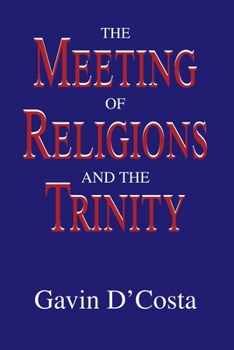The Meeting of Religions and the Trinity
(Part of the Faith Meets Faith Series)
Select Format
Select Condition 
Book Overview
Shows that many so-called pluralist theologies are actually masks for a secularizing agenda and that the doctrine of the Trinity holds more potential for interreligious understanding and dialogue. D'Costa recommends the Trinitarian approach which attains the goals that pluralism seeks: openness, respect, and learning from other religions. It accomplishes this without the reductionism associated with pluralism and by examining the serious differences...
Format:Paperback
Language:English
ISBN:1570753032
ISBN13:9781570753039
Release Date:June 2000
Publisher:Orbis Books
Length:187 Pages
Weight:0.60 lbs.
Dimensions:0.5" x 6.0" x 9.2"
Customer Reviews
0 rating





